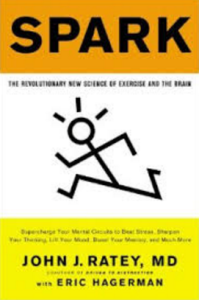![]()
 The book, “Spark: The Revolutionary New Science of Exercise and the Brain” explains in clear terms the role exercise plays in our mental processes. It’s written by author, John Ratey, MD and co-author, Eric Hagerman.
The book, “Spark: The Revolutionary New Science of Exercise and the Brain” explains in clear terms the role exercise plays in our mental processes. It’s written by author, John Ratey, MD and co-author, Eric Hagerman.
John Ratey, MD embarks upon a fascinating journey through the mind-body connection, illustrating that exercise is truly the best defense against everything from depression to ADD to addiction to menopause to Alzheimer’s. Filled with amazing case studies, the evidence is incontrovertible: aerobic exercise physically remodels our brains for peak performance. Ratey provides evidence-based conclusions that exercise reduces stress levels, increases the body’s rate of repair, reduces the impact of aging, and, most exciting to me, increases your ability to learn.
The book begins by explaining why exercise makes us feel better and then draws conclusions that show how critical exercise and movement are to our cognition. According to Ratey, “The real reason we feel so good when we get our blood pumping is that it makes the brain function at its best.”
Moving our muscles produces proteins that play roles in our highest thought processes, including increasing the number of brain cells we have. He credits our large complex brains’ to match the complexity of movement our bodies are able and indeed meant to perform. According to Ratey, “thinking is the internalization of movement.” He illustrates this with the story of the sea squirt that hatches with a rudimentary spinal cord and 300 brain cells. It has only hours to find a spot of coral on which to put down roots or die. When it does put down roots, it eats its brain. According to Ratey only a moving animal needs a brain.
What’s more, in SPARK, the authors explain the science of how exercise cues the building blocks of learning in the brain; how it affects mood, anxiety and attention; how it guards against stress and reverses some of the effects of aging in the brain; and how in women it can help stave off the sometimes tumultuous effects of hormonal changes.
All in all, the book’s main purpose is to get readers to understand how physical activity improves brain function. It motivates readers to incorporate and indeed prioritize exercise into the routine, preferably a morning routine to take full advantage of its positive effects.
The book is repetitive, but like a workout regimen, the repetition strengthens the conviction that exercising is essential to a long, healthy and happy life.
